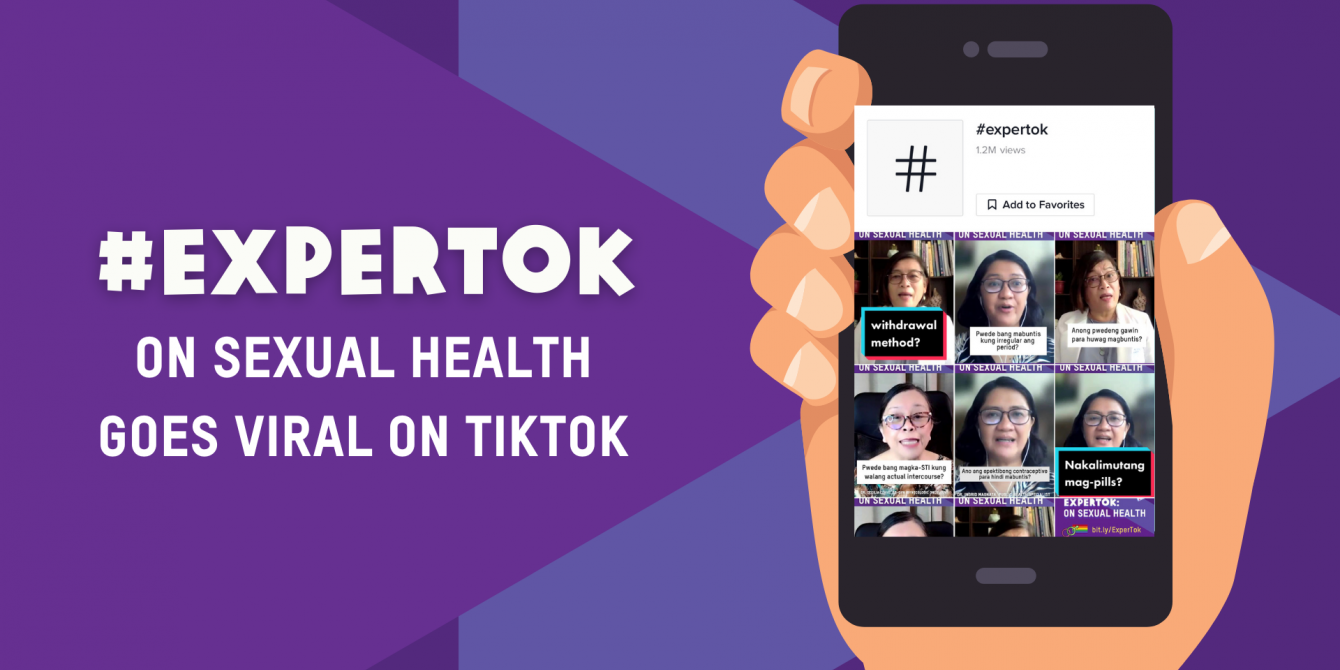Viral TikTok video shows need for sex education, health care access among Pinoys amid COVID - Oxfam, doctors

To commemorate World Sexual Health Day this September, Oxfam Pilipinas and a group of Filipino doctors released on social media short videos answering the most-asked questions about sexual health.
On video-sharing platform TikTok, the videos were met with keen interest. One video, on whether the withdrawal method is an effective family planning method, even went viral and reached half a million views.
For the first two weeks of September, adolescent medicine physician Dr. Emma Llanto, public health specialist Dr. Ingrid Magnata and OB-GYN Dr. Cecilia Llave answered questions sent by netizens to Oxfam.
With minimal boosting, Dr. Llanto’s video on the withdrawal method and the risk of pregnancy reached 600,000 views and 2,700 shares on TikTok alone. Dr. Magnata’s video on irregular periods also received almost 300,000 views on the platform. Oxfam’s relatively new TikTok account with less than 1,000 followers reached a total of 7,000 followers in just a week. The hashtag #ExperTok also received a total of 1.2 million views on TikTok.
Dubbed #ExperTok, the video series is part of Oxfam and partner organizations’ ongoing Sexual Health and Empowerment (SHE) project, which is supported by the Government of Canada through Global Affairs Canada.
“The half-month-long campaign showed just how much interested Filipinos are when it comes to their sexual and reproductive health. It also shows that they are probably not receiving enough information on it,” said Kae Umali, Project Manager of Oxfam Pilipinas’ Sexual Health and Empowerment (SHE) project.
According to the Commission on Population and Development, although there is a slight decrease in pregnancies among the 15-19 age group in the Philippines (from 182,906 in 2017 to 181,717 in 2018), it was observed that pregnancies among the younger adolescents aged 10-14 increased by 63 percent, from 1,381 in 2011 to 2,250 in 2018.
The situation was further exacerbated by the COVID 19 pandemic, with 214,000 unintended pregnancies in 2020. One out of ten pregnant women were still in their teens, according to the University of the Philippines and the United Nations Population Fund.
“Our SHE project aims to help Filipino women take control of their bodies and their futures,” said Umali. “Even before the COVID-19 pandemic, many young women and men already did not have access to sexual health services. Paired with a lack of comprehensive sex education in schools, it’s not surprising that teen pregnancy has become a big problem in the country.”
For Dr. Llanto, who specializes on adolescent medicine, it was interesting to see what the youth wanted to ask.
“The response showed that Filipinos thirst for straightforward and accurate information on reproductive and sexual health,” Llanto said.
Of those who commented on the videos, a number clearly needed to speak with a doctor or have medical attention. There were some who still believed in myths and misconceptions. Some even believed that the COVID-19 vaccine can affect their fertility, with one user insisting it was the reason why a relative became pregnant
Llanto said she realized how powerful TikTok was as a medium because it was the platform of choice of young people. “My wish is that young people will have access to comprehensive sexuality education, learn life skills and have access to adolescent sexual and reproductive health services.”
In one video, Dr. Llanto explained the problem of teenagers being in sexual relationships with partners who are much older than them. Some users commented that it was what they were seeing in popular stories online.
“Minute-long videos are definitely not enough to tackle these important issues but it is a good way to start a conversation,” said Dr. Llanto.
Oxfam’s Rapid Gender Assessment study released in December 2020 showed that this problem worsened during the COVID-19 pandemic. Its survey revealed that 50% of respondents, except those in NCR, had difficulty accessing prenatal and birthing services. In Bicol and Calabarzon regions, 60% of the female respondent said they had problematic access to STI and HIV/AIDS services. There were also 70% of homeless and internally displaced (due to conflict) women respondents in Calabarzon and BARMM who cited difficulty in accessing contraceptives.
“It is not surprising that many online users asked about how to properly use contraceptives. There were some who explained that they have not yet seen a doctor or any health service provider in the last couple of years to have their IUDs (intrauterine device) checked,” said Dr. Magnata.
Oxfam decided to use TikTok as its main platform for the #ExperTok campaign because of the trend of doctors worldwide using the platform to give medical advice or information to the public. However, there is still a lot of misinformation online and some videos do not give proper advice or guidance, especially for adolescents.
“If there’s one takeaway from our #ExperTok campaign, it’s that there really is a need for comprehensive sexuality education for the Filipino youth. Because they are not receiving sufficient answers to their questions at home or in school, they are already seeking information online where sources are not always accurate or vetted,” Umali said.
“If Filipinos are able to ask these questions online, we encourage them to directly ask their doctors or health service providers in nearby health centers. They should not hesitate or be afraid when it comes to asking important questions about their health. We also call on the government to make sexual and reproductive health information and services accessible and available to young people,” she added.
###
Kristine Sabillo Guerrero | Senior Officer for Media and Digital Influencing, Oxfam Pilipinas
Email: kGuerrero@oxfam.org.uk


 Follow us on Facebook
Follow us on Facebook Instagram
Instagram Follow us on Twitter
Follow us on Twitter LinkedIn
LinkedIn